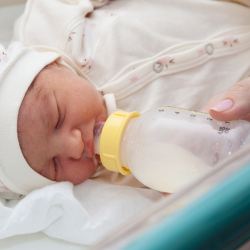"Breast is best" is a common phrase heard on the maternity floors of hospitals. Although breastfeeding is recommended by the American Association of Pediatrics, the campaign to promote breastfeeding can put unnecessary pressure on new mothers.
Breast milk has health benefits that are not found in formula, such as antibodies that ward off infection. However, we at the Council respect that breastfeeding (or pumping breast milk) may not be the best choice for a new mother and support the idea that every parent should choose what works best for their family, without judgment or guilt.
A new non-profit group, "The Fed is Best Foundation" is lending their voice to the same side of the issue. Their mission statement reads, "The Fed is Best Foundation believes that babies should never go hungry and mothers should be supported in choosing clinically safe feeding options for their babies. Whether breast milk, formula, or a combination of both."
Their message goes a few steps beyond the standard breast vs. formula feeding debate, however. They have a very specific focus on the first few days of life of a newborn - a particularly tricky time for a new parent - which is what makes fed is best's mission more complicated than the name suggests.
The first few days of life (up to four) of a newborn are a time when the mother's breast milk has not yet come in. If the baby latches onto the breast and nurses, they will drink colostrum which delivers a high dose of nutrients and immune components in a small volume. But, breastfeeding a newborn in the first few days of life is difficult - flooded with exhaustion, excitement and exhaustion (yup - there is that much exhaustion) - even in the best of circumstances.
The "fed is best" organization supports the idea that babies should be fed formula during their first days if waiting for their mother's milk takes too long. This is motivated by the fact that being under fed can cause hypoglycemia and jaundice which can, in turn, lead to brain injury. However, what is unclear is the line between the normal 3-4 day waiting period for the mother's milk to come in and dangerous dehydration - which is incredibly difficult to diagnose in a newborn.
The practice of supplementing with formula in the first few days of life is in direct contrast with people who support exclusive breastfeeding. Breastfeeding advocates warn that offering formula to a newborn will make breastfeeding more difficult in the future. This is because the mother may not make adequate amounts of breastmilk if their breasts are not being emptied and also because the baby may prefer formula and refuse breastmilk.
Fed is best was started by Dr. del Castillo Hegyi, who lays out her motivation very clearly in an open letter on the website. Her own child suffered dehydration in the first few days of life and subsequently, has been diagnosed with multiple developmental challenges including autism spectrum disorder (ASD) and ADHD. Dr. del Castillo Hegyi has said that an early lack of feeding insult may be be linked to autism. (1) With respect to the link between a delay in feeding and ASD, there's no evidence for that. Delayed feeding has adverse consequences but labeling it a cause of autism is not supported by peer reviewed publications.
And, to complicate the ASD matter more, when you look at autism awareness groups and their stance on breastfeeding, they suggest a link between formula feeding and ASD. The Autism Speaks website states, "In terms of autism risk, a number of research reports have considered breastfeeding versus formula." "However, most show that children with ASD are more likely to have been either bottle fed from birth or weaned early than are comparison groups of children not affected by ASD." The bottom line is that there is no science based conclusion on this matter, so, both sides are doing nothing more than speculating.
We can get behind the overall message of Fed is Best. Many great public health endeavors were started by motivated mothers, Mothers Against Drunk Driving (MADD) for example, and Dr. del Castillo Hegyi may be well on her way to great success in promoting supplementation of early feeding. By working to increase newborn feeding awareness and education, they are setting their sights on shifting a paradigm in newborn health. Entering into the causes of ASD may be too lofty of a goal for Fed is Best, and one better left to the ASD researchers. Additionally, with the American Academy of Pediatrics and incredibly influential breastfeeding advocacy groups promoting breastfeeding, they already are a bit of a David to more than one Goliath.
Footnotes:
Dr. del Castillo Hegyi states, in an interview posted on www.feerlessformulafeeder.com. She declined a request for an interview here.
- "I believe babies who are born with a lot of autism genetics, as predicted by having lots of scientists, mathematicians and engineers in their families, who experience a physiologic insult, such as lack of oxygen to the brain and jaundice (both demonstrated in the literature to be associated with autism) may go on to have the disabling condition of autistic spectrum disorder."

